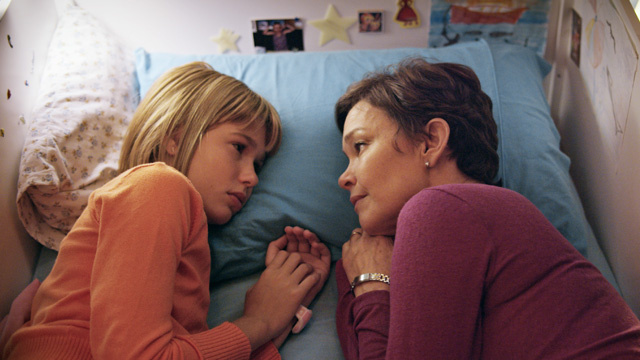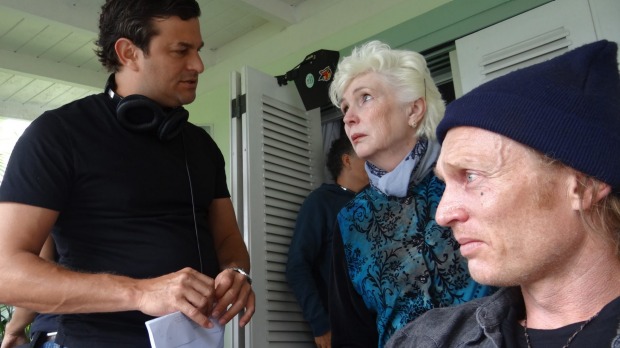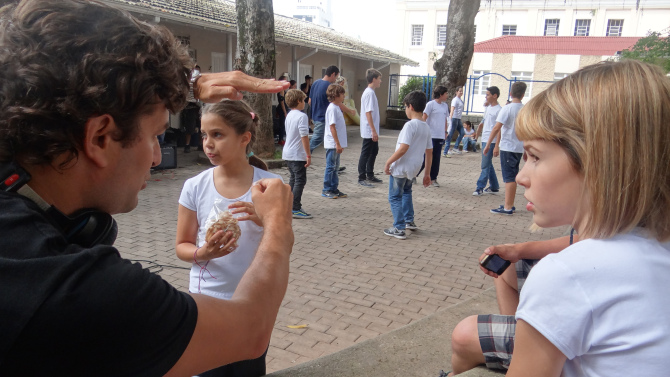Interview: Director David Schurmann on How 'Little Secret' Became Brazil's Oscar Submission
 Monday, November 28, 2016 at 10:37PM
Monday, November 28, 2016 at 10:37PM

Jose here. After a complicated, slightly controversial, submission process that saw several filmmakers remove their name from consideration, Brazil selected David Schurmann’s Little Secret as the film that would represent them at the 2016 Academy Awards. The real life drama is based on the life of Schurmann’s adoptive little sister, who went from anonymity to becoming one of the most notorious people in Brazil. Needless to say so this means that it takes an easy Google search to find out where the film goes and how some plot twists end (i.e. spoilers await). This is Schurmann’s first feature film, but not the first time he’s featured stories about his family in his work. The Schurmanns are famous in Brazil for their maritime adventures, as well as their books and documentaries. I spoke to David about working so close to his family, adding dramatic turns to reality and being part of the Oscar race.
So, here’s another less subtle spoiler warning before the full interview...
JOSE: Why was it important to turn this story into a film?
DAVID SCHURMANN: My sister Katherine wanted the world to know she was HIV positive, but that the disease didn’t rule her life. We spoke about this a lot during the last year of her life, which we didn’t know would be her last. My mother warned her she might lose friends, people might not want to hug her, because they were still very ignorant about how they could become infected. When you hear her story everything is so amazing, it spans so many countries and it’s ultimately about an act of love. I admired my parents before, but when they adopted Katherine I admired them even more. For a long time my family didn’t want to tell the story in fear they’d be prejudiced towards Katherine, it was a secret for over 10 years until my mother wrote about it, first on advice of her therapist, and then when we suggested she published the manuscript. We thought the story could give people hope and strength. Eventually I decided it would be my first fiction film, but I didn’t want to tell it through the mother’s point of view, I wanted my sister’s worldview to come through. People who have made other films about personal stories said it was important to tell something “truth”.

JOSE: You don’t see life as a series of “scenes”, so how do you turn moments from your life into drama? I admired how the film unfolds like a mystery for instance, was this hard to accomplish?
DAVID SCHURMANN: We are kind of the Cousteau’s of Brazil, so we’ve been telling stories for a very long time. I have learned to look at things like a director rather than a family member cause I don’t want to make institutional films. When I got to Little Secret I was ready to see my family as characters, rather than mother and father. Due to the intimacy there were things only I could see for instance. I also told the screenwriter Marcos Bernstein that I wanted to play with the structure so it would be like Babel or Crash. We knew we weren’t re-inventing the wheel, but we wanted to have a huge surprise when the stories clashed.
More than the Cousteaus I thought of your family as the Von Trapps because in the film it comes across how important performance was in your life. Can you talk about how art shaped you growing up?
I fell in love with filmmaking between the ages of 10-13, we sailed around the world and spent a lot of time in the Caribbean Islands. In the 80s we didn’t have video games or TVs or internet so we spent a lot of time reading books and going ashore to see movies. All the islands had movie theaters, so we’d go to French Islands and we would see French movies for example, British Islands had British movies, so these were all like magic worlds, some people said our life was a movie. As you may have noticed I loved telling stories, so I would read National Geographic and loved the photographs, so when we were in Panama I convinced my parents to buy me an 8MM camera to be able to tell stories through images. From 13-15 I read books and experimented with the camera, I was self-taught and then decided I wanted to learn filmmaking. When we went back to Brazil we arrived at a time when they were investing in film schools and great things were happening, so I stayed in the country and studied film. Film school was a joy, but it was also frustrating at times because I had already spent so much time doing films that I didn’t want to go through theory, I wanted to go out and shoot! In the boat I also listened to music my parents loved, which now sounds like “old people music”, but it was a truly magical world, we savored art in a different way. I became madly in love with Gauguin’s work because we spent time in the Marquesas Islands, so I fell in love with color as you can see in Little Secret.
Families have photo albums, yours have documentaries and a feature. Is rescuing this legacy part of your mission?
Not at all, people ask me “are you always gonna tell family stories?” and it’s not conscious, I feel like I’ll have to do a story about something else! I tap into these stories about my family but they become something else. I think a lot of directors tap into their life experience and mine has been a lot about my family, it’s subconscious though, I wanna tell good stories, and show human connection. How some connections change your life forever. I’m thinking about new movies now, and I will probably make 1 or 2 which aren’t about my family, but then I have another one about them (laughs).

Brazil had over 16 films in contention for the Oscar submission which is a big number. Was it exciting to have yours selected in the end?
We were amazed we were selected, many critics had their own picks. We knew the movie we had, we’d screened the film for the market in Berlin, outside of competition, and people came out saying “this is an Oscar film”, we heard it from people from the US, England, Germany...in Brazil we always think our kids are the cutest in the world, but when you start hearing this from others you really start to believe it! We believed in our film, but it was a great surprise. Out of the 16 films there were two films people were talking about as the ones with a chance to be selected, they were two very different beasts, different cinematic languages. When we were selected we celebrated and started working on trying to make it to the final five.
It sounds like it’s a very exciting time for cinema in Brazil!
It is, I only wish our industry was more open, right now we usually have only artfilms or broad comedies, our film is somewhere in the middle. It has artistic and commercial merits, I love Iñarritú because he does that, in Babel he has Brad Pitt in a moving movie, but it also has artistic value. I want to make films people connect to but that also have subtlety and artistry. I want to open the door in Brazil for that.


Other Foreign Film Oscar Interviews
Singapore - Boo Junfeng on the prison drama The Apprentice
Colombia - Jose Luis Rugules on Alias Maria
Italy - Gianfranco Rosi on the prize-winning Fire at Sea
Israel - Elite Zexer on Sandstorm
Foreign Film Contender Reviews
Death in Sarajevo - Bosnia & Herzegovina | Neruda - Chile | Mother - Estonia | Elle - France | Toni Erdmann - Germany | The Salesman - Iran | Chevalier - Greece | Sand Storm - Israel | Fire at Sea - Italy | Desierto - Mexico | A Flickering Truth - New Zealand | Apprentice - Singapore | Age of Shadows - South Korea | Julieta - Spain | My Life as a Courgette - Switzerland | Under the Shadow - UK | From Afar - Venezuela
 Brazil,
Brazil,  David Schurmann,
David Schurmann,  Oscars (16),
Oscars (16),  interview
interview 


Reader Comments (6)
Thanks to you nat i went on the google and cried my eyes out for this little girl
I have never heard of the Schurmanns, but they look snobs
I am from Brazil and I really HATE this pathetic "melodrama"...
It´s very sad, beacuse local politics are interfering with a country's ability to fairly choose its official candidate for the Oscars.
"Aquarius" from Kleber Mendonça Filho, with a BRAVURA performance by a great and excellent Sonia Braga, deserves the Oscar Submission.
I'm sorry, but it's true.
Aquarius, Neon Bull, Don't Call Me Son, Kill Me Please, etc... So many great brazilian films this year.
It's unfortunate that such a poor excuse of a movie is representing our country, this right-wing Brazil's product.
The only reason this movie was chosen, it was due to President intervention. The best thing is that the Minister resigned because another Minister was forcing him to aprove a business deal, just like the one informações the movie Aquarius
The irony can't be missed.
This choice was simply outrageous, led by a group of dubious people chosen by an illegitimate government.
Aquarius had should be picked to be Brazil's submission for the Oscars.